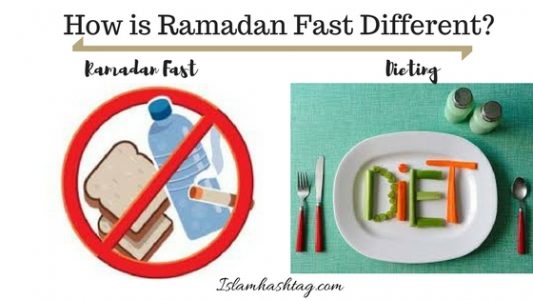HOW IS RAMADHAN FAST DIFFERENT FROM OTHER TYPES OF FAST?
Ramadan Offer
 As compared to other diet plans, in fasting during Ramadhan, there is no malnutrition or inadequate calorie intake since there is no restriction on the type or amount of food intake during Iftaar or Sahar.2.RAMADHAN ENCOURAGES SELF REGULATION AND SELF TRAINING FOR WEIGHT LOSS
As compared to other diet plans, in fasting during Ramadhan, there is no malnutrition or inadequate calorie intake since there is no restriction on the type or amount of food intake during Iftaar or Sahar.2.RAMADHAN ENCOURAGES SELF REGULATION AND SELF TRAINING FOR WEIGHT LOSS Fasting in Ramadhan is voluntarily undertaken. It is not a prescribed imposition from a physician. In the hypothalamus part of the brain there is a center called “lipostat” which controls the body mass. When severe and rapid weight loss is achieved by starvation diet, the center does not recognize this as normal and, therefore re-programs itself to cause weight gain rapidly once the person goes off the starvation diet. So the only effective way of losing weight is slow, self-controlled, and gradual weight loss by modifying our behavior, and the attitude about eating while eliminating excess food. Ramadan is a month of self-regulation and self-training in terms of food intake thereby causing hopefully, a permanent change in lipostat reading.3.NO DIETING WITH SELECTIVE FOOD
Fasting in Ramadhan is voluntarily undertaken. It is not a prescribed imposition from a physician. In the hypothalamus part of the brain there is a center called “lipostat” which controls the body mass. When severe and rapid weight loss is achieved by starvation diet, the center does not recognize this as normal and, therefore re-programs itself to cause weight gain rapidly once the person goes off the starvation diet. So the only effective way of losing weight is slow, self-controlled, and gradual weight loss by modifying our behavior, and the attitude about eating while eliminating excess food. Ramadan is a month of self-regulation and self-training in terms of food intake thereby causing hopefully, a permanent change in lipostat reading.3.NO DIETING WITH SELECTIVE FOOD In Islamic fasting, we are not subjected to a diet of selective food only (i.e. protein only, fruits only etc). An early breakfast, before dawn is taken and then at sunset fast is broken with something sweet i.e. dates, fruits, juices to warrant any hypoglycemia followed by a regular dinner later on.4.ADDITIONAL PRAYER WHICH METABOLISE FOOD
In Islamic fasting, we are not subjected to a diet of selective food only (i.e. protein only, fruits only etc). An early breakfast, before dawn is taken and then at sunset fast is broken with something sweet i.e. dates, fruits, juices to warrant any hypoglycemia followed by a regular dinner later on.4.ADDITIONAL PRAYER WHICH METABOLISE FOOD Additional prayers are prescribed after the dinner, which helps metabolize the food. Using a calorie counter, The amount of calories burnt during extra prayer called Traveeh. It amounted to 200 calories,according to a study.. Islamic prayer called Salat uses all the muscles and joints and can be placed in the category of a mild exercise in terms of caloric out put.5.FASTS BREAK THE ADDICTIONS
Additional prayers are prescribed after the dinner, which helps metabolize the food. Using a calorie counter, The amount of calories burnt during extra prayer called Traveeh. It amounted to 200 calories,according to a study.. Islamic prayer called Salat uses all the muscles and joints and can be placed in the category of a mild exercise in terms of caloric out put.5.FASTS BREAK THE ADDICTIONS Ramadhan fast is actually an exercise in self discipline. For those who are a chain smoker, or nibble food constantly, or drink coffee every hour, it is a good way to break the habit, hoping that the effect will continue after the month is over.6.I AM FASTING:
Ramadhan fast is actually an exercise in self discipline. For those who are a chain smoker, or nibble food constantly, or drink coffee every hour, it is a good way to break the habit, hoping that the effect will continue after the month is over.6.I AM FASTING: Psychological effect of Ramadhan fast are also well observed by the description of people who fast. They describe a feeling of inner peace and tranquility. The prophet has advised them “If one slanders you or aggresses against you, tell them I am fasting”. Thus personal hostility during the month is minimal.Ramadhan Fast changes us spiritually and physically for good and makes us energetic.
Psychological effect of Ramadhan fast are also well observed by the description of people who fast. They describe a feeling of inner peace and tranquility. The prophet has advised them “If one slanders you or aggresses against you, tell them I am fasting”. Thus personal hostility during the month is minimal.Ramadhan Fast changes us spiritually and physically for good and makes us energetic.What Happens To Your Body When You Don’t Eat For 16 Hours
Ramadan fasts are from fazr to Maghrib usually around 14 hrs and can be around 16 hrs .Let us see what happens to the body when you don’t eat for 16 hrs.- Stabilizes insulin levels
- Gives you more energy
- Dramatically reduce risk of chronic diseases & obesity.
- Stops sugar cravings & hunger pangs
- Boosts growth hormone naturally
- Lowers triglycerides & prevents Alzheimer’s
- Reduces free radical cell damage
- Better brain health
- Regan A.R. Gurung (21 April 2014). Multicultural Approaches to Health and Wellness in America. ABC-CLIO. p. 149. ISBN 9781440803505.
- “Fasting and your health”. NHS Choices. 21 July 2012. Retrieved 29 June 2014.
Discover more from Islam Hashtag
Subscribe to get the latest posts sent to your email.





